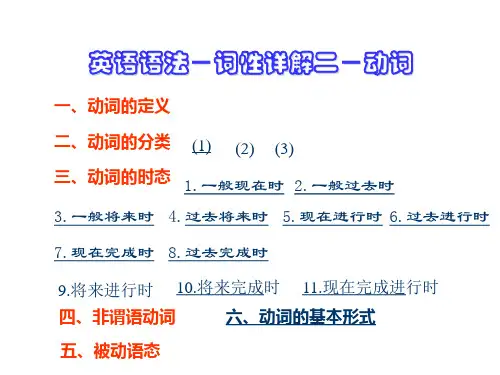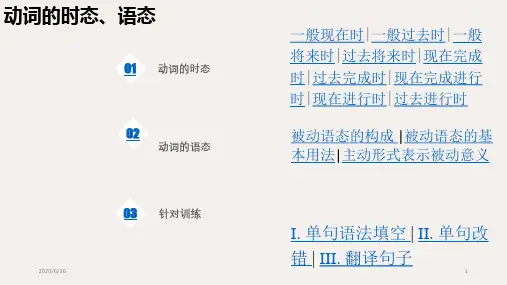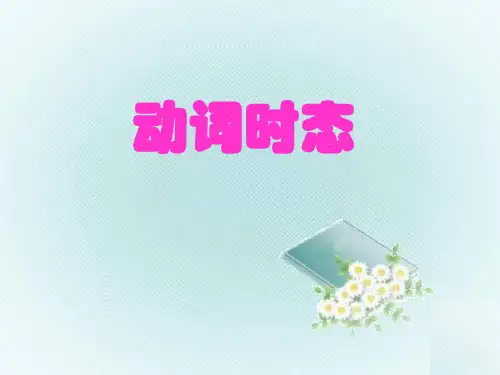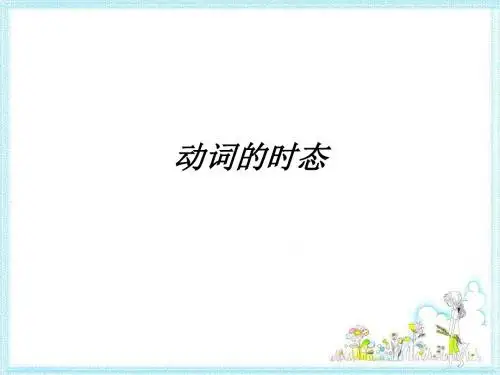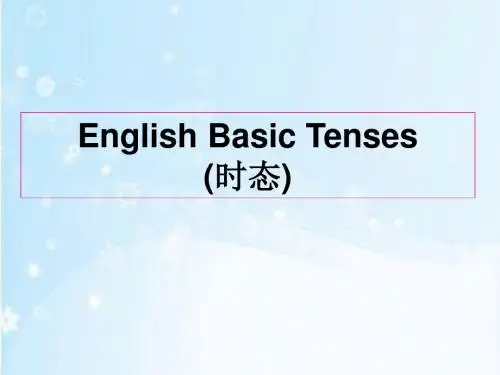- 1、下载文档前请自行甄别文档内容的完整性,平台不提供额外的编辑、内容补充、找答案等附加服务。
- 2、"仅部分预览"的文档,不可在线预览部分如存在完整性等问题,可反馈申请退款(可完整预览的文档不适用该条件!)。
- 3、如文档侵犯您的权益,请联系客服反馈,我们会尽快为您处理(人工客服工作时间:9:00-18:30)。
导入之二:How did you spend your childhood?
Example:
I _s_p_e_n_t__ (spend) my childhood happily with my old friends. We always __p_la_y_e_d__(play) football and basketball together and we __d_id__n_’t_ (not) have so much homework to do as now. We __w_e_r_e__ (be) happy at that time.
1. be going to 有很强的计划性,打算干什么,而will 表示谈话时临时决定的意图,具有临时性和偶然性。
① ----The telephone is ringing. ----I _____ answer it.
√A. will B. am going to C. am to D. am about to
动词过去式did will (shall)+动词原形 be going to+动词原形 be about to+动词原形 be to+动词原形 would+动词原形 will (shall)+be+现在分词
am (is, are)+现在分词
常用时间状语
always, usually, often, sometimes, every..., twice a week 等
4.Bill and Tom are hard--working students .They never leave (leave) today’s work for tomorrow. 5.I’ll tell him about it as soon as he comes (come) back.
②would 注重过去习惯性发生的动作。
1.At the end of the meeting, the headmaster gave (give) us a talk.
2.Listen! The radio says a serious accident _h_a_p__p_e_n_e_d (happen) last night.
I'm going to play football tomorrow afternoon.
4.be about to do 表示“正要干什么…”, 1)表示即将发生的动作,不与表示将来的时间状
语连用。
2)常与when 连用,when 此时意思: 就在这时, 是并列连词.
3)构成句型: ①… be about to do …when…. ②…was / were doing… when… ③be on the point of doing…when… ④had just done sth…when…
时间状语 now, during these days, 或 look, listen 等引起注意的词语
过去进行时 was (were)+现在分词
at eight (this time) yesterday 等
现在完成时
过去完成时 现在完成进
行时
have (has)+过去分词
already, just, yet, since..., for...等
① I don’t really work here. I’m helping until
the new secretary comes.
② Selecting a mobile phone for personal use
is no easy task because technology___ so
5.I was going home when I met (meet) an old friend.
• picture
犹如
导入之三:How will you spend your National holiday? I will… I’m going to…
三. 一般/过去将来时
表示将来时的四种形式 ① will / shall + 动词原形 ② be going to do ③ be about to do ④ be to do
rapidly.
A. will have changed B. has changed
√C. is changing
D. will change
2. 表示(过去)目前这段时间内正在进行的动作, 但说话时动作未必正在进行。
She _i_s _le_a_r_n_i_n_g__ (learn) piano under Mr. Smith at present.
英语的常见时态:
现在
过去
将来
过去 将来
一般
一般 现在时
一般 过去时
一般 将来时
过去 将来时
进行
现在 进行时
过去 进行时
将来 进行时
完成
现在 完成时
过去 完成时
将来 完成时
完成进行
现在完成 进行时
过去完成 进行时
时态 一般现在时 一般过去时
一般将来时
过去将来时 将来进行时 现在进行时
构成
do(第三人称单数does)
4)按计划、规定,时间表(如汽车、飞机、会 议)等将要发生的动作或存在的状态, 一般用于 be, come, go, start, begin, leave, arrive, return等位移/终止性动词,常与时间状语连 用.
The train leaves at three this afternoon. The meeting starts at 2:00 p.m.
1.----Look! Someone has spilt (溢出)coffee on the carpet(地毯).
----Well , it __B___ me.
A. isn’t
B. wasn’t
C. hasn’t been D. hadn’t been
2.He pretended (pretend) that a tiger toy was real and giving it a voice. (11广东)
2) 用一般过去时表示过去经常发生的动作 (也可用 “used to do”或 “would do” 代替)。 During the vacation she often swam /
would swim / used to swim in the sea. I used to smoke.
注意:①used to 表示过去常发生而现在不再发 生的动作或存在的状态。
3.与always,constantly(不断地;时常地), usually, frequently, all the time等连用,表 示赞成或厌恶的感情色彩。如:
He is always helping others. He was always thinking of others,never
English Basic Tenses (时态)
他每天都来。 He comes every day. 他昨天来了. He came yesterday. 他已经来了. He has come. 他明天来. He will come tomorrow.
汉语借助词汇手段而非词的形态变化来 表示动作的发生,而英语主要通过谓语动词 时态变化来表现.任何句子都要先注意时态.
5)在时间、条件、方式、让步状语从句中,用一 般现在时代替一般将来时,即主将从现。 If it__is__ (be) fine tomorrow ,wew_i_ll_g_o___ (go) to the countryside. If he c_o_m__e_s_ (come) this afternoon,we __w_i_ll_h_a_v_e__ (have) a meeting.
yesterday, the day before yesterday, the other day, last..., ...ago 等
tomorrow, the day after tomorrow, next..., in...等
多用于间接引语的宾语从句中
at eight (this time) tomorrow 等
② ---Alice, why didn’t you come yesterday?
√ ---I _____, but I had an unexpected visitor.
A. had B. would C. was going to D. did
2. be going to 可用来表达某种迹象要发生的事。 而will 不能表示
二、一般过去时 ( The Simple Past Tense )
1. 结构: 谓动用动词过去式 (V-ed)
2. 用法: 在过去时间里所发生的动作或存 在的状态。常与表示过去时间的时间状 语连用。如 yesterday, last week, an hour ago, in 1982等。
1)表示过去发生的,和现在没有联系的动作或状态
had+过去分词
by..., before...等
have (has)+been+现在分词 for..., since...等
导入之一:How is your daily life as a high school student?
( using 3 sentences or more,使用实意动词 和系动词, 注意动词形式变化)
Look at the clouds! It _i_s_g_o_i_n_g_t_o_ rain.
3. be to 表示因约定、计划,职责、义务 要求即将发生的动作, 或客观安排或受 人指示而做某事。 be going to 表示主观的打算或计划。
